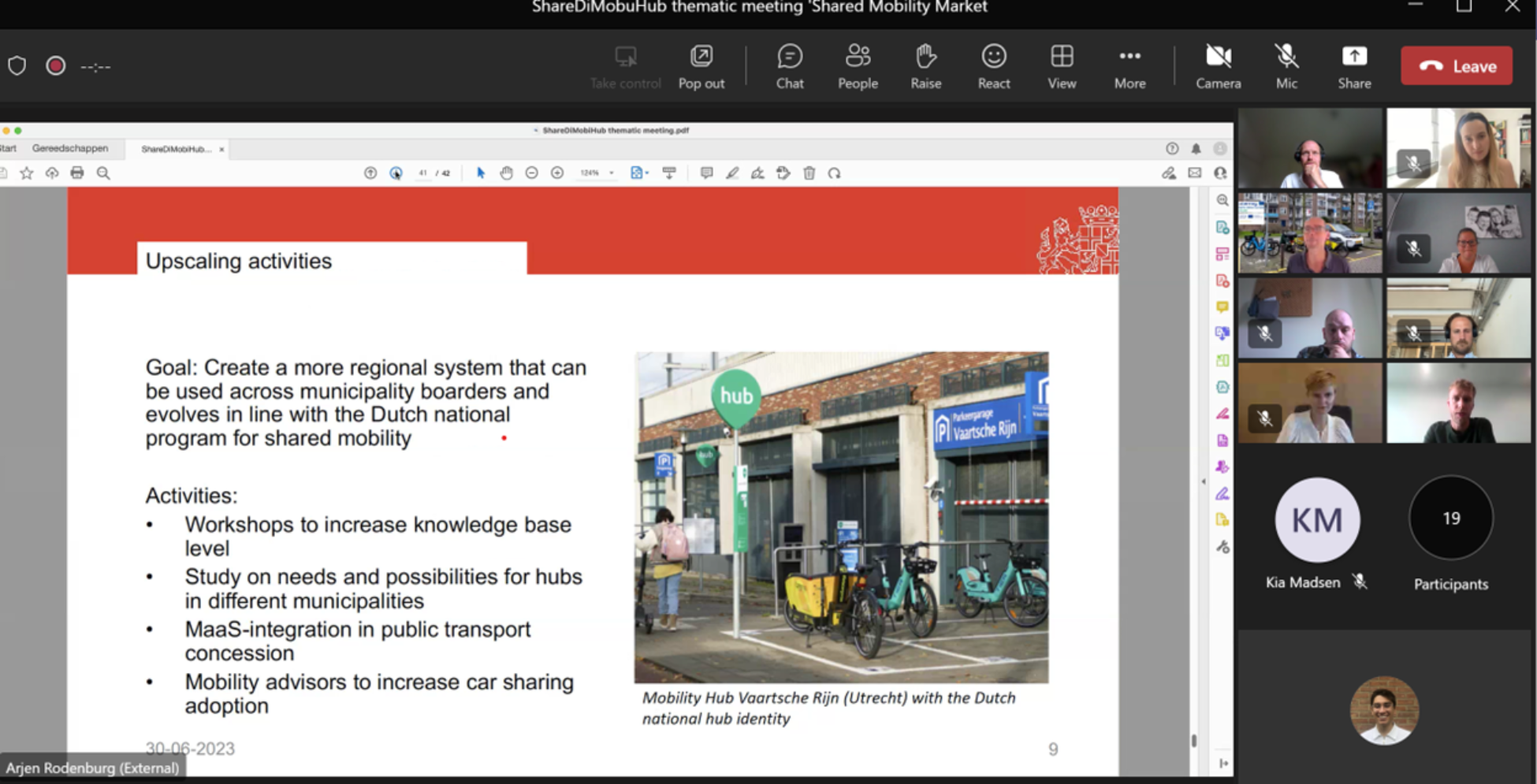On June 30th, ShareDiMobiHub and service providers met up for a thematic meeting. Their goal? To chat about what's next for shared travel. They're excited to make big changes for the future.
In a concerted effort to enhance urban multi-modal accessibility, ShareDiMobiHub is undertaking an ambitious project to promote shared mobility hubs and their integration into the Mobility as a Service (MaaS) ecosystem. This initiative, involving seven partner cities and regions across four North-Sea countries, seeks to stimulate a behavioural change in transportation habits, encouraging a shift from private car ownership to shared mobility.
As part of a series of activities to share and increase the knowledge about shared and digital mobility hubs within the consortium, the project has been organizing a series of thematic meetings to address the most important topics when implementing a shared and digital mobility hub strategy. Reflecting on our latest thematic meeting, we engaged in a thorough and enlightening discussion about the ever-evolving Shared Mobility Market.
The pivotal role of local governments, as demonstrated through legislation and strategic engagement with shared mobility providers, was a key focus of the discussions. Drawing from the experiences of initiatives in partners involved we explored the impacts of government participation in shaping a more sustainable, efficient, and user-friendly urban transportation landscape.
The project meeting began with a warm welcome and introduction by Arjen Rodenburg, the project coordinator. Arjen set the stage for the day's discussions, pointing up the figures of shared mobility in Europe and the importance of collaboration among key stakeholders to shape its future.
Overview of the Market by POLIS
Karen Vancluysen, Secretary General from POLIS, provided an insightful overview of the shared mobility market in Europe, including its regulatory framework and trends. Guided by data from the recent European Shared Mobility Index by Fluctuo, she examined the evolving landscape. Karen highlighted the growing prominence of e-scooters, a tendency that, despite its popularity, remains a contentious issue in urban planning and management. She further emphasized the pivotal role of forward-thinking governance systems in developing regulatory frameworks to foster the growth of new mobility services and their respective business models. Importantly, she stressed the necessity of such systems to also mitigate negative externalities effectively. Lastly, she referred to the POLIS report “Sharing data for shared micromobility”. The report indicates there is considerable scope for improvement in terms of cooperation between mobility service providers and regulatory authorities on key topics, such as data sharing and ensuring equitable access.
Panel Discussion Moderated by Karen Vancluysen
Following the market overview, Karen Vancluysen moderated a panel discussion with esteemed industry representatives and policy officers. The panel aimed to explore various perspectives on the current trends and challenges in shared mobility.
Micromobility for Europe
Irene Cobián, accompanied by her colleague Sebastian Schlebusch, opened the discussion by providing a brief introduction to the Micromobility for Europe coalition. Sebastian shared MMfE's figures on the prevailing contribution of micro-mobility to sustainability and safety in transport. Irene argued that there is a clear need for regulation also for the proper functioning of micro-mobility services. However, this will also need to come with more investments in micro-mobility, and harmonisation of technical standards to avoid fragmentation and finally cooperate with industry instead of outright bans.

City of Antwerp
Michiel Penne, representing the City of Antwerp, provided an instructive narrative of the city's approach to managing the shared mobility market. He discussed this from dual perspectives – both from a regulatory angle and a strategic policy standpoint. Michiel elaborated on the challenges faced by the Belgian city deploying regulatory frameworks in such a growing field with multiple options. He further accentuated how Antwerp has established specific admission and exploitation prerequisites in the realm of shared micro-mobility. These regulations serve as key criteria to assess the performance of providers. In order to guarantee the best services possible, the City of Antwerp has also developed a multimodal mobility manager. “This digital dashboard gives us a clear view of operators and the functioning of their vehicles. Next to internal use for evaluation purposes, we also share relevant data about micro-mobility vehicles via our ‘Smart Ways to Antwerp’ app that we currently offer to people traveling in and around the city.” he emphasized.
Discussion and Q&A Session
The meeting transitioned into an engaging discussion and question-and-answer session. Participants eagerly exchanged thoughts, seeking clarifications, and shared valuable insights. This interactive session proved to be a pivotal moment for stakeholders to connect, exchange ideas, and address pertinent concerns.
2-Minute Pitches by ShareDiMobiHub Partners
Following the engaging discussion, representatives from the ShareDiMobiHub partners took turns presenting their plans for upscaling shared mobility and highlighting their collaboration strategies with the market.
Amsterdam showcased their innovative projects aimed at enhancing shared mobility within the city. Leuven, the Capital Region of Denmark, Rotterdam, the Province of Utrecht, and the Transport Authority of Amsterdam each followed suit, unveiling their ambitious plans to further develop and integrate shared mobility services.
The panel members offered brief reflections on each pitch, highlighting the partners' dedication and emphasizing the importance of collaboration and knowledge sharing to drive shared mobility initiatives forward.
Conclusion
As the meeting came to an end, the project coordinator expressed his gratitude to all the participants for their valuable contributions. The meeting had successfully fostered a sense of shared purpose among ShareDiMobihub partners but also with key stakeholders paving the way for future collaborations. With the shared mobility agenda firmly set, North-Sea Region cities are poised to embrace a transformative future of sustainable and efficient transportation through Multi-modal accessibility.
